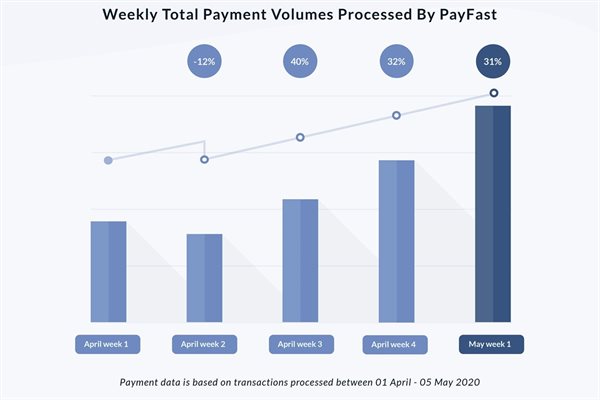
Related
Top stories



ESG & Sustainability#BudgetSpeech2026: SRD grant unchanged, other Sassa social grants see hike
6 hours



More news











ESG & Sustainability
South Africa’s carbon tax should stay: climate scientists explain why











“This pandemic has been a shot of adrenalin in the arm of e-commerce. Habits formed now are going to continue in the future,” said Jonathan Smit, MD of online payment processing solution PayFast.
Smit was speaking during in an interview with Insaka eCommerce Academy founder Warrick Kernes during the PayFast eCommerce Virtual Summit, which is being hosted online from 25-28 May.
“The online shopping trend was happening anyway, but we’re forced to do it now,” Smit said.
Recent Nielsen research revealed that 37% of South Africans are saying they are shopping more online, and Smit added that older generations are now opening up to e-commerce as it poses fewer health risks than venturing outdoors to do grocery shopping.
He said that while physical retail will remain relevant for a long time, including in developed markets, businesses need to embrace e-commerce as a distribution channel as it’s where future growth lies.
Smit said that PayFast saw a decrease in transaction volumes when South Africa's nationwide lockdown began, but this was followed by a surge as people moved their businesses online to continue trading in some way.

Because of this, the online payment gateway has seen an 83% year-on-year increase in total new business account registrations since the lockdown began. Smit said that for the first time, a few days ago, the company surpassed 4,000 new accounts within a 30 day period.
PayFast reported a 226% year-on-year increase in new business account registrations in the food industry since restrictions were put in place in mid-March. In order to continue trading during the lockdown, many local businesses pivoted their product offering to provide essential goods, resulting in a significant spike in the food sector.
Businesses with e-commerce capabilities, for example Granadilla Swim and NetFlorist, could complete the transition to supply essential goods relatively swiftly as they already had distribution channels, courier relationships and a platform from which to sell.
According to PayFast data, grocery stores, supermarkets and bakeries are among the retailers who benefited the most during the first two weeks of lockdown with a 357% increase in sales, while more niche product categories like pet-care and essential goods for babies also experienced notable sales growth.
Rather than give rise to new trends, Smit said the pandemic has simply accelerated and amplified the business innovation that was already taking place.
Looking ahead, he predicts that grocery delivery will become more commonplace locally, as it’s offering a more desirable way for consumers to get their goods home without the need to contend with queues and crowds.
Furthermore, he expects physical and online retail to blend more seamlessly together. “Whether its click and collect, whether it’s going to the store, or shopping online and getting delivery to your home, I think it’s all going to just become ‘retail’ - part of the same ecosystem and the same machine.”
